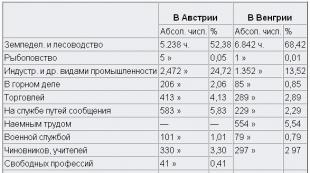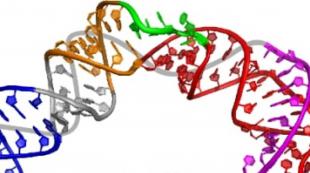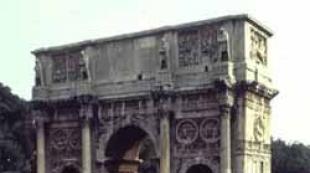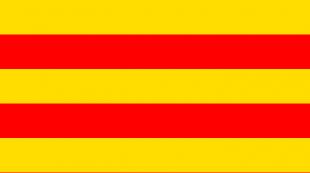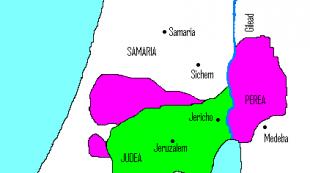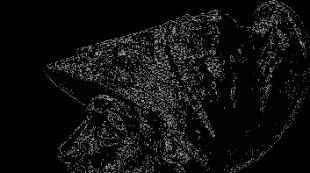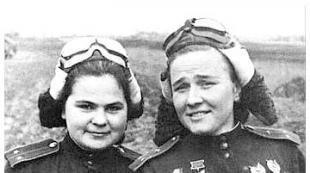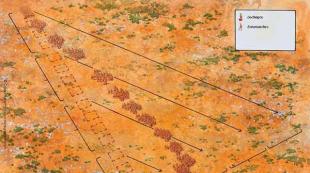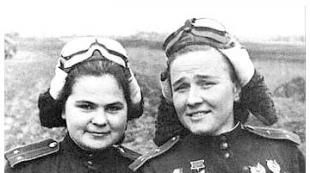Brief biography biography of Baratynsky Evgeny Abramovich. Evgeny Abramovich Baratynsky biography From what Baratynsky died
My gift is poor, and my voice is not loud,
But I live, and on my land
Anyone kindly being:
My distant descendant will find him
In my poems; who knows? my soul
It will be with his soul in intercourse,
And how I found a friend in a generation,
I will find the reader in the offspring. (E. Baratynsky)
Evgeny Abramovich Boratynsky (Baratynsky; 1800-1844) - Russian poet, friend of Pushkin, one of the most significant Russian poets of the first half of the 19th century.
Baratynsky was a "sincere and passionate seeker of truth", his work is distinguished by the depth of philosophical thought, the perfection of the artistic form.
Life path
He came from an old Polish family that settled in the 17th century. in Russia. The poet was born on February 19, 1800 in a noble family in the village of Mara in the Kirsanovsky district of the Tambov province. He received his primary education in the village, under the supervision of an Italian uncle, then in the St. Petersburg French boarding house and the page building. As a result of a serious offense - theft of a fairly large amount of money from a friend's father - he was expelled from the corps with a ban on entering the service forever, except for the military as a private. This punishment greatly shocked Baratynsky (he fell ill with a serious nervous breakdown and was close to suicide) and left an imprint on his character and subsequent fate.
The troubles of Baratynsky's relatives about his forgiveness were not crowned with success, he left for St. Petersburg and entered the ranks of the Life Guards Jaeger Regiment. Soon he was promoted to non-commissioned officer, with the Neishloth Infantry Regiment, he went to Finland, where he spent about 5 years. He was fascinated by the harsh majestic nature of Finland, he watched the local customs, way of life, all this is reflected in his work.
The first poem by Baratynsky was published with the help of A. Delvig in the Blagonamerenny magazine in 1819, 1823-1824. - the time of the closest proximity of Baratynsky with K. Ryleev and A. Bestuzhev, who publish his poems in the Decembrist almanac "Polar Star". But civic poetry was not Baratynsky's vocation. However, the well-known epigram on the Minister of War A. Arakcheev "Enemy of the Fatherland, Servant of the Tsar" (1825) and some other works speak of the rather oppositional mood of the young poet, but the idea of changing the foundations of life seems to him futile and useless.
The enemy of the fatherland, the servant of the king,
To the scourge of peoples - by autocracy -
Some kind of hellish love of grief,
He is not familiar with another passion.
Hiding from the eyes, he acts evil in the dark,
To act more freely.
You don't need a name: everyone has it in their mouths,
As a terrible name for the lord of the underworld.
Finally, on April 21, 1825, Baratynsky receives officer rank, goes on vacation and then retires. Changes are also taking place in the poet's personal life: he marries Anastasia Lvovna Engelhardt. She did not possess any particular beauty, but the poet himself said about her in the poem "She":
There is something in her that is more beautiful than beauty,
That speaks not with feelings - with the soul;
There is something in her over the heart of autocracy
Earthly love and earthly delights.
Baratynsky's marriage turned out to be very happy.
Lyrics of Baratynsky 1826-1834 acquires an ever deeper philosophical character, reflections on the role of the poet and poetry, on the fate of mankind and art, on life and death, on human passions and the laws of eternal beauty ...
In 1842 Baratynsky published the last collection of poems "Twilight", which included poems from 1834-1841. During this period, the motive of the discord between the surrounding reality and the inner world of a person intensifies:
The century walks along its iron path;
Poetry, childish dreams
Baratynsky died suddenly, while traveling abroad, in Naples on June 29, 1844. His body was transported to St. Petersburg, where he was buried in the Alexander Nevsky Lavra next to Krylov, Gnedich, Karamzin at the Tikhvin cemetery.

In the Muranovo estate near Moscow, where Baratynsky spent the last years of his life, a literary-memorial museum of E.A. Baratynsky and F.I. Tyutchev "Muranovo" - from 1816 to 1918. Muranov was owned, successively replacing each other, by four families connected by kinship - the Engelhardts, Boratynskys, Putyaty and Tyutchevs. Each of them was involved in the literary life of Russia.
Creativity E. Baratynsky
According to many literary scholars, the main lines of Baratynsky's work were parallel to Pushkin's: both began by imitating the dominant models of the beginning of the century - Batyushkov's erotic-elegiac poetry, Zhukovsky's elegies; both passed the stage of a romantic poem; finally, the last period in the work of both is colored by a distinct realistic style of writing. But despite the similarity of the main lines, Baratynsky's poetic style is distinguished by a remarkable originality - "originality", which the same Pushkin so noted and appreciated in him ("he never dragged on the heels of his life as a captivating genius, picking up dropped ears of grain: he walked his way alone and independent ").
As mentioned above, the youthful mistake and its consequences left a strong imprint on the fate of the poet: his work is distinguished by sharp individualism, concentrated loneliness, isolation in himself, in his inner world, the world of "dry sorrow" - hopeless reflections on man and his nature, humanity and its destinies.
There is being; but what name
Name him? It is neither a dream nor a vigil;
Between them it is, and in man it
Reason borders on madness.
He fully understands his own,
And while the waves are on him,
Some of the others are rebellious, more capricious,
Visions run from all sides:
As if his old homeland
He was given over to spontaneous confusion;
But sometimes, ignited by a dream,
He sees a light that is not frank to others.
("The Last Death", 1827, excerpt).
The external world, nature for this lyrics are only “landscapes of the soul”, a way of symbolizing internal states. All these features take Baratynsky out of the circle of poets of the Pushkin galaxy, make his work close and akin to the poetry of the Symbolists. At the same time, due to the preservation of economic ties with the nobility, Baratynsky, like none of the poets of the Pleiades, feels his affinity with the "graceful" XVIII century - the "powerful years" - the period of the highest estate flourishing of the nobility; he hates the impending bourgeois-capitalist culture:
The century walks along its own iron path;
In the hearts of self-interest, and a common dream
Hour by hour vital and useful
Busy more clearly, shamelessly.
Disappeared in the light of enlightenment
Poetry, childish dreams
And generations are not worried about her,
Devoted to industrial concerns.
("The Last Poet", 1835, excerpt).
Along with elegies, Baratynsky's favorite genres are characteristic "small genres" of the 18th century: madrigal, album inscription, epigram. A rationalist seeking to overcome his rationalism, a "decadent" in themes and their specific sharpening, a symbolist in some of his techniques, an archaist in language, in the general character of style - such complex, contradictory elements make up an integral and highly peculiar poetic image of Baratynsky, "not general expression "- which the poet himself rightly recognized as his main merit.
I am not blinded by my Muse:
They won't call her a beauty
And the young men, seeing her, followed her
They will not run with a crowd in love.
Lure with an exquisite dress,
I play with an eye, brilliant conversation,
She has neither inclination nor gift;
But the light is glimpsed
Her face is uncommon
Her speech is calm simplicity;
And he, rather than a caustic condemnation,
She will be honored with casual praise.
("Muse", 1829).
Lyrics of Baratynsky 1826-1834 becomes more and more philosophical. In the lyrics of these years, elegiac reflections are heard about the role of the poet and poetry, about the fate of humanity and art, about life and death, about human passions and the laws of eternal beauty ...
In 1842 Baratynsky published the last collection of poems "Twilight", which included poems written in 1834-1841.
Somewhat apart from the lyrics of Baratynsky are his poems, eclipsed from his contemporaries by the work of Pushkin.
The deeply peculiar poetry of Baratynsky was forgotten throughout the century, and only at the very end of the century did the Symbolists, who found so many related elements in it, renewed their interest in Baratynsky's work, proclaiming him one of the three greatest Russian poets along with Pushkin and Tyutchev.
Evgeny Baratynsky, Russian poet of Polish origin. He lived a very short life and died in a foreign land. Some call him a great writer of the 19th century, others say that his talent is too exaggerated. Nevertheless, Evgeny Baratynsky left his mark on the history of Russian literature as a poet and writer.
His literary activity developed in several stages. He first began writing poetry after he was expelled for indecent behavior from the most famous military school. Russian Empire- Pages of the Corps. After his poems began to gain fame, Baratynsky developed very friendly relations with the leading writers of that time and soon he began to attend various literary performances.
Then comes the period of military service, and his poems take on the outlines associated with the army. At this time, the most famous poems of Baratynsky began to appear on the pages of the leading anthology "Polar Star". After leaving the service and returning to Moscow, Yevgeny Baratynsky completely devotes himself to writing. A certain glory comes to him at the age of 26, after two of his poems were published - "Feasts" and "Ed", then there were no less famous poems - "Concubine" and "Ball". His poems continue to be published in leading almanacs and magazines. At the very end of his life, Yevgeny Baratynsky moved abroad. There he also met many writers and made a certain impression on them. But by this time, his literary activity is heading towards its decline. He will be able to write only one poem, which will be called - "Piroscaf", implying the philosophy of life and death. And although he was a very modest, shy person, and did not like to be in the spotlight, his contribution to Russian literature was very colossal.
Today, the poems of Yevgeny Baratynsky arouse different interest among readers. However, some of his poems deserve special attention. For example: "Elegy", "Muse", "Star", "Recognition", Waterfall, Piroscaf, Wonderful City will sometimes merge. They are all filled with a certain energy and evoke a sense of grace.
All of the above verses are among the most iconic works of Yevgeny Baratynsky. They are easy to read and have a certain meaning. After analyzing these poems, we can say with confidence that we chose them as our main work for a reason.
More details
Baratynsky's legacy is dear and important to today's reader. He entered the history of Russian literature as a recognized master of philosophical lyrics.
The poet was born in 1800 in the Mara estate of the Kirsanovsky district of the Tambov province. The parents' estate was located in a picturesque area. Since childhood, Eugene has absorbed love for his native land, as a result of which he often came here to relax. He originally received home education... From childhood, his parents were engaged with him. At the age of 5, he could read and write, not only in Russian, but also in French. In 1812 he was enrolled in the Corps of Pages. However, the poet did not find a common language with the teachers and in 1816 was expelled from the corps for disgusting behavior. In addition, he did not have the right to enter any service other than the military. In the autumn of the same year, he arrived in St. Petersburg and began to serve as an ordinary private in the Jaeger regiment. In 1823 he departs with his regiment to Moscow. After 2 years, Eugene receives an officer's rank and comes to the capital to his mother, who at that time was very sick.
In 1826 he married the eldest daughter of General L.N. Engelhardt Anastasia. The wife inspired Yevgeny Abramovich to create new works. Soon he meets P.A. Vyazemsky. They became close friends. They were united by common literary interests, occupations, tastes. Pushkin also heard about the talented poet, who highly appreciated his work. Returning from exile, he immediately met with Baratynsky and in 1829 they were elected to members of the Society of Lovers of Russian Literature at Moscow University. Their friendship was so strong that in 1828 Pushkin's work "Count Nulin" and Baratynsky's "Ball" were published in one book. In 1831, Baratynsky published the poem "The Concubine", which was later revised and became known as "The Gypsy". After 4 years, he published his second collection of poems.
Soon the poet meets Lermontov. This meeting prompted him to release the definitive collection of Twilight creations. In 1843, the poet went abroad with his family, where he met the writers Mérimée and Vigny in Paris. However, having arrived in Italy, in 1844, Baratynsky suddenly dies. And to this day, we admire in his poems a peculiar poetic manner, an energetic and well-aimed syllable for all manifestations of life, wisdom and love of freedom.
Biography of Baratynsky for children grade 4
Evgeny Baratynsky is the most underestimated Russian writer. A person about whom a variety of incredible things are said, to the extent that unique abilities are attributed to him. This man truly earned his place in history, but, unfortunately, he is one of the most underestimated writers of that time, most likely due to the fact that at one time he did not gain sufficient popularity in order to perpetuate his name in the history of Russian literature.
Evgeny Baratynsky was born in 1800, in a small village. The Baratyn clan comes from an ancient aristocratic clan, which at one time held fairly high positions in the political games of the nobility. He himself grew up in a fairly peaceful environment, in which he was loved, and very carefully about his education. Since his father was a military man, he decided to let his son follow in his footsteps, and throughout his childhood he prepared his son for military service, which he was very happy about. As a child, the boy showed pretty good results in all the sciences that he had to study. He was also particularly good at languages and literature, showing his talent to his parents.
After graduating from primary school, his parents send him to a private educational boarding house, where he also shows excellent results, as well as his literary talent. Teachers strongly recommend that parents direct the young man's talent in the right direction, however, as it seems to his parents, his fate is a foregone conclusion, and he will become a military man. After graduating from the boarding house, the young man goes to the best military educational institution at that time, and writes letters home that he wants to devote his whole life to military service, and this is his main goal and task. But, in connection with one unpleasant case of theft of money in the institution, the young man is sent home, with a previous expulsion from the educational institution.
At the age of 19, the young man decides to go to the service. At first, he serves in a small regiment, in a low rank, but later receives an officer's rank, but since he does not really like military life, he drops everything and goes to the capital. There he makes new acquaintances and begins to work on his first works, as he feels his craving for literature. Feeling all the hardships on himself, filled with inspiration, he published his first work in 1819. Further, his literary career went upward, after which they began to talk about him at least a little, to which the young man was very happy.
In the last years of his life, Baratynsky sets off with his family on a trip to Europe, in which he meets many interesting personalities who again inspire him to write works, but the new work was never destined to be published, since Baratynsky suddenly died of strong headaches. pain.
Biography by dates and Interesting Facts... The most important thing.
Other biographies:
- Fidel Castro
Fidel Castro (1926 - 2018) - famous Cuban revolutionary, communist, politician. He led the Republic of Cuba from 1959 until his death in 2016.
- Alexander III
Alexander III - All-Russian Emperor who ruled the country from March 1, 1881 to October 20, 1894. Known as the Tsar-Peacemaker, since during the entire period of his reign, the country did not know battles and wars.
- Immanuel Kant
Immanuel Kant was a great German philosopher who laid the foundations of classicism in philosophy. Most of the philosopher's works were sorted into quotes by descendants.
- Childhood and adolescence of Lermontov briefly
The year 1814 was famous not only for Russia's military successes, but also for the birth of the great poet M. Yu. Lermontov. A son named Mikhail was born in the family of retired captain Yuri
- Vysotsky
Everyone knows and many love the classic of Russian literature Yevgeny Abramovich Baratynsky. The biography of the writer is full of many different events associated with frequent travel and a long separation from the homeland. It is to these bright moments of the author's life that our article is devoted.
early years
Baratynsky was born in 1800, at this time Alexander I came to power, whose liberal rule in the future will be replaced by the laws of Nicholas I, which will seriously affect the life of the writer. On March 19, Yevgeny Baratynsky was born on the estate of an old Polish family (Tambov province). The boy was brought up on the estate of Mara by his mother and an Italian uncle. Thanks to the latter, he learned Italian early. And by the age of eight he could communicate fluently in French. In 1808 he was sent to the St. Petersburg German boarding school, where the writer's studies continued.
After the death of his father, Baratynsky Yevgeny Abramovich returns to Mary. At this time, the mother is preparing her son for admission to the Corps of Pages. And thanks to her efforts, the boy in 1812 became a graduate of this prestigious institution.
Tambov province
After the end of the Corps of Pages, Baratynsky (the biography of this period is not distinguished by bright events) returns to his family in the Tambov province, where he begins to write poetry. At first, his works are very weak from a technical point of view, but gradually the poet masters the skill. By 1819, the style of Baratynsky was formed, which the writer was proud of and considered the main merit of his poetry.
Petersburg
In 1819, he moved to St. Petersburg and entered the Jaeger Regiment as a private. During this period, he got acquainted with the capital literary society Baratynsky. The biography of the writer is full of meetings with Delvig, Zhukovsky, Pushkin, Kuchelbecker, Pletnev. He becomes a welcome guest in literary salons.

Thanks to Delvig's efforts, Baratynsky's works were published for the first time: "To Kuchelbecker", "To Krenitsyn", the poem "Feasts". And in 1823 collections of the poet's poems appeared.
Finland
In 1820, Baratynsky was transferred to the Neishlotsky regiment, located in Finland. The regiment is commanded by a relative of the poet, G. A. Lutkovsky, so Baratynsky lives with him, enjoys considerable privileges and often visits St. Petersburg. However, the writer himself is burdened by his position. He does not belong to the soldier class, but he is not given an officer's rank, and he will not ask for service - such behavior can be perceived as disrespect for the authorities. And Baratynsky has less and less in common with "light". The biography of the nobleman did not provide for military service, which made the writer feel inferior.
In Finland, Baratynsky spends five years - from 1820 to 1825. This excommunication from his homeland was vividly reflected in his poetry: the poems "Waterfall", "Finland", the poem "Eda".

In 1824, thanks to the petitions of Baratynsky's friends, he was transferred to Helsingfors, where he served at the headquarters of the Governor-General. During this period, the poet falls in love with a married woman - A. F. Zakrevskaya. This love brought him a lot of suffering, but thanks to her such verses as "Fairy", "Justification", "I am reckless - and not wonderful ..." and many others were born.
Officer rank
The fact that the poet could not get an officer's rank for a long time was due to the independent tonality of his work and a number of opposition statements, which Baratynsky very often allowed himself in the light. Evgeny Abramovich rose to the long-awaited rank only seven years later (in 1825). This gave the poet the opportunity to control his own destiny. In the same year, Baratynsky went to visit his mother in Moscow and did not return back, and in 1826 he officially retired.
Return to Russia
Immediately upon returning to his homeland, the poet marries Anastasia Lvovna Engelhardt and enters the service in the Land Survey Office. Baratynsky's life becomes dull and monotonous. Family life smoothes out all the defiant, rebellious character traits of the writer.

This state of affairs greatly influenced the work of Yevgeny Abramovich. His works are less and less appreciated by the public, they no longer have such a tremendous success as early works. However, the writer is not going to give up new attitudes and innovative ideas. Baratynsky's poetry of this period was not understood by critics and contemporaries, only Pushkin was able to appreciate it. The poem "Ed" was given special attention of this great writer.
Attitude towards the Decembrists
Yevgeny Abramovich was not an active opponent of the political system and did not adhere to the Decembrists, but the very idea secret societies captured him. However, the work of Baratynsky still reflected the poet's opposition to the government. For example, the elegy "The Tempest" showed all the indignation and indignation of Baratynsky regarding the reprisals against the Decembrists. For the poet, the collapse of the movement became a symbol of the defeat of the ideas of freedom and the best human aspirations.
The magazine "European"
In 1831, Baratynsky's friend I. V. Kireevsky began to publish the "European" magazine. Yevgeny Abramovich, as a sign of support, began to write prose stories for the publication, among which the famous "Ring" can be noted. Baratynsky's articles for the magazine were full of critical remarks about contemporary writers, reviews of political events. In the "European" appeared not only Baratynsky the poet, but also Baratynsky the critic, as well as a politician. However, the magazine was soon closed, which greatly upset the writer, and he fell into melancholy.
Last years
In the last years of his life, Baratynsky's relations with contemporary writers deteriorated greatly, and the poet found himself in isolation. The situation is aggravated by the break with old friends - Kireevsky, Pushkin, Khomyakov. The result was the seclusion of the writer and his family in the Muranovo estate, located near Moscow.
Baratynsky's poems about love during this period of creativity fade into the background, giving way to tragic and philosophical reflections on modernity and loneliness. The stylistics of the works themselves are also changing - they are distinguished by discontinuity, discord and extreme anguish.

In 1843, Baratynsky with his older children went on a trip abroad. During the trip, the writer visited Germany, Paris, where he made acquaintance with N.I. Turgenev, as well as France. The poet regains faith in the future and a cheerful mood, which is reflected in his work (the poem "Piroscaf").
Baratynsky goes through Marseille by sea to Naples, where he writes his last work - the poem "To the Italian Uncle". Back in Paris, shortly before leaving, Baratynsky felt unwell, but he ignored the doctor's advice about the dangers of the hot climate and continued his journey. On June 28, 1844, the poet suffered an attack of severe headache, followed by a fever, and the next day he died.
Baratynsky's wife, Anastasia Lvovna, survived her husband for 16 years, and after her death she was buried next to him at the Tikhvin cemetery.
Lyrics features
Baratynsky's poems about love prevail in all the poet's work. This is due to the fact that Yevgeny Abramovich was one of the romantics. His work reflected the hardships and sorrows of the modern poet of the time. Baratynsky's great merit is his ability to vividly portray inner world a person with his inherent contradictions and difficulties. The poet was very passionate about what he described, his poems are full of anxiety, anxiety and deep feelings.
Baratynsky considered the following points to be the main points for creativity: thought, originality and simplicity. And according to these three components, he created.
Evgeny Baratynsky: "Spring"
The famous poem “Spring, Spring! How Clean The Air ”is a wonderful example of Baratynsky's landscape poetry. The work describes the rebirth of nature with delight, trepidation and tenderness. The lyrical hero rejoices, he is happy, his soul sings.

The poem sounds simple and easy. It does not differ in an unnecessarily high syllable or complexity of structure, but it is thanks to this that the reader can feel the delight and awe of the author, his exultation and praise of the blossoming nature.
Spring was the poet's favorite season. In a letter to his mother, written in 1815, Baratynsky noted what a tremendous influence the contemplation of the transformation and decoration of nature in springtime has on his soul. He talked about the joy and exultation that fills his heart, about the walks that give him true pleasure.
Collection "Twilight"
It came out in 1842 and was the last collection of Baratynsky's poems. It includes works written from 1835 to 1842. They were presented in a lyrical cycle, a united image, which became the title of the entire book. Twilight here appears as a symbol that, on the one hand, marks the finale of the life and work of Baratynsky himself, and on the other, contains a hint at the end of the existence of the spirituality and culture of all mankind.
Baratynsky practically does not write about nature in this collection, the poet creates a philosophical genre of epigram, where the object dissolves in abstraction and generalization. Examples of such works: "I love you, goddess of feathers", "To plant a forest", "Cotterie" and many others.

The poet expresses his sorrowful thoughts about the fate of art and humanity. He is worried about how society perceives and will perceive the poet. Draws many disappointing conclusions.
Baratynsky's later poems differ sharply from his early works. If earlier the main things were clarity and clarity, now the writer often uses complex syntax, archaic vocabulary, oratorical techniques, which greatly complicates perception.
Baratynsky Museum
The Evgeny Abramovich Baratynsky Museum is located in the historical center of Kazan. It is located in the outbuilding of the estate that once belonged to the poet's wife. The family of the writer himself lived on the estate for a long time, and later - his numerous descendants.
The history of the museum began in 1977, when a literary exhibition dedicated to the legacy of Baratynsky was opened at the Kazan School No. 34. Only in 1981 did the museum acquire the status of a state museum, and ten years later it moved to the estate, which Baratynsky loved so much.
The anniversary (2010) of the writer was celebrated in Kazan on a wide scale, and the museum took an active part in this. On its territory, lectures on the life and work of Baratynsky were held, rare exhibits were exhibited, additional excursions were conducted for schoolchildren.
Evgeny Baratynsky is a chronological table of life and work set out in this article.
Chronological tableEvgeniyaBaratynsky
Is a translator and a Russian poet. He is one of the most mysterious, flamboyant and underestimated figures in Russian literature.
1800 February 19 / March 2- Evgenia Abramovich was born in the village of Vyazhlya in the family of a retired general.
1808 - began to study at a German private boarding school in St. Petersburg.
1812 - after mastering the German language, Baratynsky was admitted to the Corps of Pages.
1816 - Yevgeny Abramovich was expelled from the corps for tricks and constant violation of strict rules in the educational institution.
1819 - enters as a private in the Jaeger Regiment of the Life Guards. He began to write poetry.
1820 - he was transferred to the Finnish Neyshloth 87th Infantry Regiment in the new rank of non-commissioned officer.
1824 - Baratynsky receives an offer to transfer to the Helsingfors corps headquarters to General Zakrevsky. There he fell in love with his boss's wife, which caused him many problems.
1825 - retired as an officer. This year he married Anastasia Engelhardt.
1827 - publishes his first collection of poems and poems.
1832 - Evgenia Abramovich begins to cooperate with the publication of Ivan Kireevsky - "European".
1835 publishes the second collected works.
1842 - published the collection "Twilight".
1843-1844 - Baratynsky goes abroad. First he visited Paris, Berlin, Dresden, Frankfurt, then moved to Naples.
1844, July 11- Evgeny Abramovich dies after suffering an illness. He was buried in St. Petersburg.
Yevgeny Baratynsky interesting facts from the life and work of the Russian poet and translator are presented in this article.
Baratynsky interesting facts from life
Baratynsky's mother was the maid of honor of Empress Maria Feodorovna
Perfectly owned three foreign languages - Italian, French and German
He was friends with Delvig, Kuchelbecker, and the historian Putyata
The first poem by Yevgeny Baratynsky was published in 1819
Loved to travel- traveled far and wide all over Germany, was in Paris, Marseille, Naples
Evgeny Baratynsky never put any punctuation marks in his poems, with the exception of commas. He was so poorly versed in grammar that, as they say, once, in all seriousness, asked Delvig what he called the "parent" case. Even his poems Yevgeny Baratynsky sent for publication to Delvig, and he always gave them to his wife so that she would rewrite them. When she asked how much to rewrite, Delvig replied that she would rewrite to the point. But she was not there. Even at the end of the verse there was always a comma
He lived in Finland for five years, serving in the Neishloth regiment with the rank of non-commissioned officer
In 1826 he married the eldest daughter of Major General Lev Engelhardt named Anastasia. Three children were born in marriage
His wife suffered from mental disorders, which also affected the poet's health. He suffered from unbearable headaches
His famous poems - "Eda", "Feasts", "Ball", "Concubine", "And I am rejected again"
We hope that from this article you learned interesting facts about Yevgeny Baratynsky.
